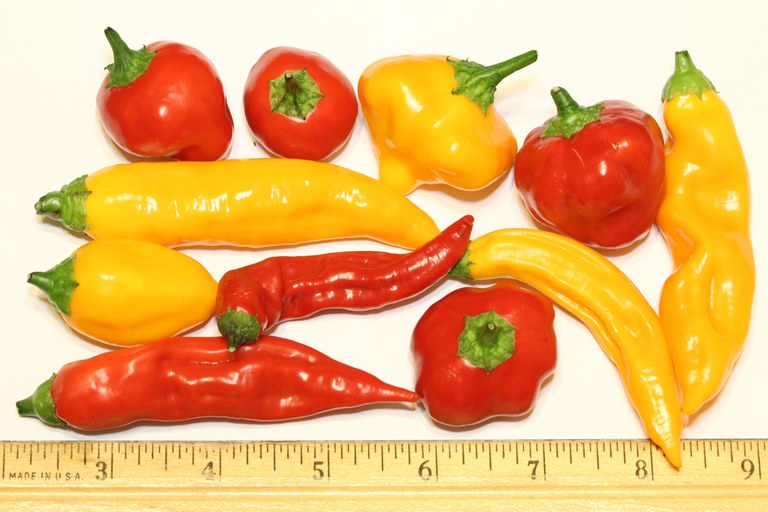Posted: February 20, 2025
Penn State Extension Franklin County Master Gardeners undergo a pepper breeding project through the Grow-Save-Repeat program.

Variety of peppers of the F2 cross. Photo Credit: Ron George.
Whenever I open a seed catalog, I feel like a kid in a candy shop. Do I turn to the tomatoes first because they're my favorite, or save them for last? I glance over the new introductions. A purple carrot? I thought carrots were supposed to be orange. That's a cucumber? It looks like a lemon to me. Ooh, a more cold-hardy rosemary–that would be nice!
Do you ever wonder where all these different plant varieties come from? Some estimate that there are over 10,000 tomatoes alone!1 Certainly, many varieties were developed by professionals, but there are plenty that were developed by regular people–home gardeners like you. This is part of what the Grow-Save-Repeat (GSR) program is all about.
GSR started in 2021 as a collaboration between Penn State Extension and Delaware Valley University. It was designed to give Master Gardeners the knowledge and tools to educate home gardeners on how to save seeds and breed their own varieties. When I heard about this program, I thought, "That sounds like fun! I've been gardening for over 25 years, and I never even thought of breeding my own plants."
In 2022, Franklin County Master Gardeners joined GSR. To start, we grew the tomato and pepper plants provided by Delaware Valley. We were also trained in the techniques used to cross breed tomatoes, peppers, and squash.
I grow lots of pepper plants in my own garden, so I have plenty to practice on. I took my tweezers, found some pepper flowers at the proper growth stage, and cross-pollinated them. Cross-pollination is basically taking pollen from one plant variety and using it to pollinate another variety, usually of the same species. I made quite a few crosses–not all of them were successful, but some of them were! I saved the seeds from the resulting pepper. Step one is complete.
In 2023, we planted a few seeds from one of my crosses, Brazilian Starfish X Aji Chinchi Amarillo F1. The F1 designation means that the seed or plant is a first-generation hybrid. You will often see this listed on plant tags and seed packs. The peppers on that plant weren't shaped like either parent, but they did ripen to red like the Brazilian Starfish does, unlike the yellow Aji Chinchi. We saved the seeds from those peppers. Step two is complete.
In 2024, we again planted seeds from the cross–now designated as F2 since they are a second generation (similar to grandchildren). We grew 13 plants. We wanted to grow as many plants as possible so we could see all the shapes and sizes that resulted from mixing the DNA. It was so exciting when the first baby peppers appeared–we had different shapes! As the peppers ripened, we had some red and some yellow ones. We did taste tests on all the different peppers and saved seeds from each plant separately. Step three is complete.
For 2025, we are going to choose our favorite pepper from the 13 and grow several of them. The fruit won’t all look the same, but after several more generations, it will (as long as it doesn't get cross-pollinated!). We use blossom bags to prevent cross-pollination. These are small, draw-string bags made of sheer fabric that we put on an unopened flower. Once the flower opens, the bag prevents insects from introducing pollen from other pepper plants.
It takes several generations to get the seed stabilized so it comes back true each year. We'll save seeds from the peppers that look and taste like we want. We are on the way to developing our own pepper variety that tastes great and grows well in Franklin County. How cool is that? Very, if you ask me!
Stop by our Demonstration Gardens across from the Extension Office on Franklin Farm Lane. The GSR beds are inside the fenced Victory Garden. Look for the colorful sign. We plan to have peppers, tomatoes, and new for 2025–melons. We will also be teaching classes on GSR and seed saving as part of the Victory Garden educational series. I hope to see you there!
References:
1 Colorado State University Extension Master Gardener: Growing Tomatoes
Written by ~
Tracy Snyder, Master Gardener, Franklin County

